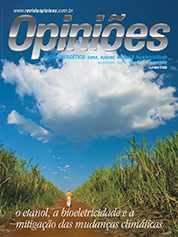Suzana Kahn Ribeiro
Secretary of Climate Change of the Ministry of the Environment
Op-AA-22
Bioethanol as a Means to Mitigate Climate Change
Climate change may be viewed as one of the main global challenges to be avoided in the current and forthcoming centuries. Thus, Brazil must plan the way, not only to reduce its emissions, thereby contributing to the stabilization of greenhouse gases (GHG) in the atmosphere, but also to prepare itself for the adoption of a new climate regime.
The Fourth Report of the Intergovernmental Panel on Climate Change states that global warming is unequivocal. The recent change in climate was observed in direct observations of increases in average temperatures of the air and the sea. Eleven of the last twelve years (1995 to 2006) are among the twelve hottest in the registration, using instruments, of the global temperature.
In this respect, the National Policy on Climate Change will provide the country two permanent national objectives:
1. Reduce anthropic emissions by sources and enhance anthropic removals through GHG sinks within the country, and
2. Define and implement measures to promote the adaptation to climate change of local communities, municipalities, states, regions, and economic and social sectors, particularly those especially vulnerable to its adverse effects.
An important instrument of the National Policy is the National Plan on Climate Change, which is intended not only to coordinate actions that take place, directly or indirectly, for the purpose of reducing GHG emissions, thereby increasing their removal through sinks, but also to enhance other initiatives, apart from promoting new initiatives.
Thus, the National Plan on Climate Change may be considered “a work in progress”, given that it is constantly being updated. Apart from these main objectives, one is also searching for knowledge gaps, both for the better implementation of mitigation initiatives, and also for the increase in knowledge about the country’s climate vulnerabilities, to be able to draw up an action plan for adaptation.
Concerning mitigation, the main challenges facing Brazil are: on the one hand, the reduction of its emissions resulting from the use of the land, and land usage changes, and on the other hand, economic and social growth, following a path of rational and efficient use of natural resources, thereby causing the least possible environmental impact.
The means for Brazil to face the challenges of climate change will be both through mitigation and adaptation strategies, however one should emphasize the relevance of deepening one’s knowledge about the costs of such alternatives, so as to opt for the most cost effective initiatives for the country. Thus, it becomes imperative that public policies be laid out to face the challenges associated with mitigation and adaptation to climate change.
However, the strategies for these mitigation and adaptation initiatives must take into consideration the specific aspects and vulnerabilities of each country or region. It is up to Brazil to harmonize its actions with economic and social development processes. The alternative, for Brazil, with great mitigation potential, which simultaneously promotes national development, is the use of bioethanol, both in replacing liquid fuel in the transportation sector, and as input in electric power generation.
Bioethanol also meets the demand for energy diversification. From a strategic point of view, this is interesting, because bioethanol can be produced in different regions. From the environmental point of view, it is also positive, given that it is produced from renewable biomass, its CO2 (the main gas causing the greenhouse effect) emissions are practically eliminated when biomass grows again, given that, to that end, one uses the same CO2 contained in the atmosphere.
It is in this context that bioethanol plays an important role in terms of mitigating GHG effects, whether in the transportation sector, or in the generation of electric power. In Brazil, the cultivation of sugarcane for the production of alcohol as fuel is already an example for the world, of a competitive energy alternative based on biomass.
Obviously, one does not expect bioethanol to fully replace products derived from oil, however, it may surely become a significant part of the world energy matrix, particularly in the transportation sector. In this regard, Brazil must position itself to uphold its leading position in the production of biofuel. The whole world is getting ready to produce it.
However, Brazil has enormous competitive advantages, such as the availability of land for agriculture, hydric resources, and a favorable climate, among others. One of the instruments currently under negotiation is NAMA (National Appropriate Mitigation Action), which consists of nationally appropriate mitigation initiatives.
This instrument surfaced on the occasion of the Bali process (Bali Road Map), as a means to encourage developing countries to reduce their expectations concerning the increase in emissions. For each NAMA, one expects financial offsetting on the part of the developed countries. Unlike the CDM (Clean Development Mechanism), NAMA does not handle specific projects, but rather a national initiative, intended to provide the country the needed structure.
In this way, one hopes that bioethanol may represent an important NAMA for Brazil in a new climate regime. Brazil, as a developing country, is committed to reducing emissions, i.e., to decelerating the growth curve of GHG emissions. Most of the possible deviation from this curve, in 2020, is expected to occur due to the reduction in deforestation rates in Amazonia.
If we maintain the same growth rate, in a trend scenario, the reduction in deforestation in Amazonia will represent a deviation of about 20% in the year 2020. However, Brazil can do more for the global effort of reducing world emissions, through other mitigation initiatives. Bioethanol has enormous potential in cooperating towards the Brazilian emissions’ curve deviation, therefore being an important NAMA with great impact in the new negotiation period.




